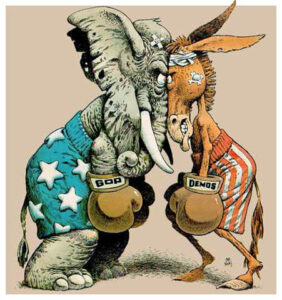 The United States is in a Presidential election year. For political junkies, the day to day battle of who said what matters greatly. And in November, we will elect a new President and Congress. Though elections matter for the short term goals of liberals and conservatives, the question for us here is do politics matter for philately.
The United States is in a Presidential election year. For political junkies, the day to day battle of who said what matters greatly. And in November, we will elect a new President and Congress. Though elections matter for the short term goals of liberals and conservatives, the question for us here is do politics matter for philately.
The short answer is no, politics do not matter for our hobby. There are two broad time lines that affect philately. In the short term, politics have an influence on our economy. During times of high inflation or monetary turbulence, stamps rise in price as an inflation hedge and as collectors are less inclined to hold monetary investments such as stocks and bonds. During times of strong economic growth, stamps price rises are muted as alternate investments are more attractive. Certainly politics affect the economy. But the two political parties constantly argue and run their platforms on which party will help the American economy perform the best. And economists disagree as well. Everyone wants low inflation, rapid growth and general prosperity. The disagreement is on how to get it.
The real issues having to do with philatelic popularity are long term and will be little influenced by this election or really any election. Two factors are working to reduce the appeal of stamp collecting. First, there are few young collectors today who will stay with the hobby or migrate back when they are middle aged. And second, mail and stamps are an increasingly rarely seen on mail in our high tech age. Weighing against this as a positive factor is the demographic trend of the retiring baby boomers. Most serious stamp collectors have always been men 65-85 who, retired or working less, rekindle their interest in the hobby of their childhood. This trend is certainly happening. But whether there are enough returning collectors in the next twenty years to offset the decline in interest in younger collectors is the question that will determine the strength of our hobby over the next few decades. So when you ponder who to vote for in the primaries and the general election, the health of your hobby is one less thing that you need to factor in when making your decision.
